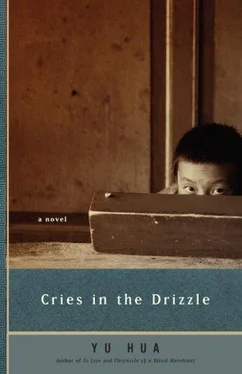As he awaited the new title of “Father of a Fallen Hero,” Sun Kwangtsai decided his home needed a makeover. Such a disorderly household, he realized, might compromise the government envoys’ assessment of our credentials. The makeover began in the clothing department: with money he had borrowed, my father had a new outfit made for each of us. This made me an object of attention, and how to deal with me became a real headache for Sun Kwangtsai. More than once I heard him say to my brother, “It would all be so much simpler without him in the way.”
After ignoring me for so long, my family now acknowledged my existence, only to discover that I was a millstone around their necks. Nonetheless, one morning Mother came up to me, a set of new clothes under her arm, and asked me to put them on. Absurdly, we all wore the same color. Accustomed as I was to going around in tattered old clothes, I felt ill at ease the whole day through in this stiff new outfit. After gradually having faded from the consciousness of my neighbors and classmates, I once again was noticed. When Su Yu said, “You're wearing new clothes,” I was thrown for a loop, even though he delivered this line so calmly as to make me feel that nothing was wrong.
A couple of days later my father realized that his approach had failed to reap the expected dividends. He now felt that thrift and fortitude were the family virtues that ought to be showcased, and the most threadbare clothes in our possession emerged from hiding. My mother sat bent over under the oil lamp for a whole night, and the following morning we donned clothes with patches all over, like scales, and like four ridiculous fish we ventured out to greet the new dawn. When I saw my brother set off reluctantly for school, for the first time I felt that there were moments when he and I had the same reaction to things.
Sun Guangping lacked Sun Kwangtsai's unswerving confidence in the arrival of good fortune. He was the butt of so many jokes for wearing his ragged clothes to school that he refused to go on wearing them, even if their continued use should qualify him to become emperor. My brother thought up a compelling justification for his abandonment of this costume, telling my father, “To wear the kind of clothes that one could find only in old China is an insult to the new communist society.” This remark left Sun Kwangtsai quite rattled, and for the next several days he was constantly explaining to the villagers that we had just one purpose in dressing as we did and that was “recalling the bitter to think of the sweet”: “When we think of the miseries of the old society, we are all the more aware of how wonderful life is in the new society.”
The government representatives, so eagerly awaited, failed to show even after a month had passed. As a result, public opinion shifted, and this boded ill for my father and brother. Now, in the slack season, the villagers had more than enough time to get to the bottom of things, and they realized that all the reports they had heard ultimately emanated from my family. My father and brother came to be seen as comic figures and were made the target of their banter. Everyone would ask Sun Kwangtsai or Sun Guangping, in tones of exaggerated solicitude, “Did the officials come yet?”
The fantasy shrouding my family began to come apart at the seams. Sun Guangping was the first to retrench. With the ruthless practicality of youth he felt, sooner than my father, that none of it would ever materialize.
In the first few days of his disenchantment, Sun Guangping seemed glum and subdued, and often he just stayed in bed. Since my father remained firmly ensconced in the fantasy world, relations between the two of them became increasingly distant. Father had developed the habit of sitting by the radio with a foolish expression on his face, saliva dribbling from his half-open mouth. Sun Guangping clearly was tired of seeing him making such an ass of himself and once he said with exasperation, “Stop thinking about it!”
This had the effect of infuriating my father, who jumped up, spraying spit and cursing, “Get the fuck out of here!”
My brother came back with a stinging retort: “Try saying that to the Wang brothers.”
My father screamed like a child and threw himself at Sun Guangping. He didn't say he was going to kill him, but rather: “Let's have it out!”
Were it not for Mother, whose tears and diminutive figure were the only obstacles in the way of these two raging males, our home, already so ramshackle, might well have ended up a complete ruin.
As Sun Guangping marched out the door, his face livid, he happened to see me and said, “The old man can't wait to get in his coffin.”
My father was in fact quite isolated by this time. He and my brother had lost the sense of fellowship that had prevailed in the wake of my little brother's death, and it was now impossible for the two of them to sit together feverishly picturing their wonderful future. Sun Guangping's withdrawal left Father by himself in the fantasy world, and he alone had to contend with the dreadful thought that the government representatives might never show up. Just as Sun Guangping grew increasingly impatient with Father, Sun Kwangtsai likewise was on the lookout for opportunities to pick a fight with him. For a long time after that row, they were either looking daggers at each other or treating each other with coldness.
My father paid close attention to the little dirt road at the entrance to the village, on tenterhooks for the arrival of the government envoys in their formal wear. His secret was soon discovered by the village children, and often boys would run up to our front door and shout, “Sun Kwangtsai, the men in suits are here!”
The first few times he was thrown into a tizzy, as jittery as an escaped convict. I watched as he raced pale faced to the village entrance, then came back, utterly deflated. The last time that he was duped was during the onset of winter, when a nine-year-old boy ran over, shouting, “Sun Kwangtsai, lots of men in suits are coming!”
Sun Kwangtsai rushed out, clutching a broom. “I'm going to have the hide off you, you little bastard!”
The boy took off right away, and when he had reached a safe distance he shouted back, “If I'm lying, then my mom's a bitch and my dad's a dog!”
This oath, so disrespectful to his parents, left Sun Kwangtsai a bundle of nerves as he returned to the house and paced to and fro, wringing his hands and talking to himself: “If they really are here, what are we going to do? I've made no preparations.”
So anxious was he that he made another dash to the edge of the village, only to see empty fields and sparse, lonely trees. I was sitting by the pond, and watched as Father stood dumbly at the village entryway. He hugged his chest to shield himself from the gusting wind, and after a while he squatted down and began rubbing his knees. As dusk fell at the waning of the year, Sun Kwangtsai crouched there shivering, his eyes fixed on the track that wound its way toward him from the far distance.
Father clung to his dreams until, with the approach of Spring Festival, he had no choice but painfully to abandon them. From every house in the village came the sound of rice flour being pounded into New Year's cake, but our home, rent with divisions as it was, showed not the faintest sign of a holiday approaching. Finally Mother summoned up the courage to ask him, “What are we going to do for New Year?”
My father had been sitting dejectedly by the radio. After deep thought he said, “It looks like the officials are not coming.”
I began to notice that Father was sneaking glances at my big brother, and it was clear that he was eager they be reconciled. On the last day of the lunar calendar he finally spoke up. Sun Guang-ping had just finished dinner and was about to go out when Sun Kwangtsai called him back. “There's something I want to talk to you about.”
Читать дальше












